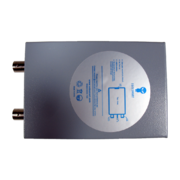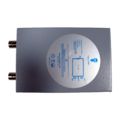SainSmart DDS120
 | |
| Status | supported |
|---|---|
| Source code | hantek-6xxx |
| Channels | 2 |
| Samplerate | 50MHz |
| Analog bandwidth | 20MHz |
| Vertical resolution | 8bit |
| Triggers | none (SW-only) |
| Input impedance | 1MΩ‖25pF |
| Memory | none |
| Display | none |
| Connectivity | USB |
| Website | sainsmart.com |
The SainSmart DDS120 is a USB-based, 2-channel oscilloscope with an analog bandwidth of 20MS/s and 50MS/s sampling rate.
This device appears to be a rebadge of the Rocktech BM102 (or vice versa). The lsusb is exactly the same, the PCB is exactly the same (both have a "656517" and "102LJT1402" silkscreen), and the components used appear to be the same as well.
The device was apparently created by someone named "buudai" in 2012 (also reflected in the lsusb and in the former buudai.com website).
See SainSmart DDS120/Info for more details (such as lsusb -v output) about the device.
Hardware
- USB: Cypress CY7C68013A-100AXC (FX2LP) (datasheet)
- 64-kbyte I²C EEPROM: Microchip 24LC64I (datasheet)
- Crystal: 24MHz
- 145 MHz FastFET Opamps: AD8065ART-R2: (datasheet)
Or in newer hardware:
- Dual 8bit, 100MSPS ADC: MXTronix MXT2088 (datasheet)
- 145 MHz FastFET Opamps: AD8065: (datasheet)
- 4x CMOS differential 4-channel analog mux/demux with logic-level conversion: Texas Instruments CD4052B(M) (datasheet)
Photos
Teardown 1:
Teardown 2 (purchased 03/2016):
Protocol
We use an open-source firmware for this device (i.e., not the vendor firmware/protocol), hence we do not need to know the vendor protocol. There is some historic vendor firmware/protocol info for those interested, though.
Firmware
In order to use this device, the sigrok-firmware-fx2lafw (>= 0.1.4) firmware is required.
The firmware was originally written by Jochen Hoenicke (see README for details), thanks a lot!
Note: The firmware is not flashed into the device permanently! You only need to make it available in the usual place where libsigrok looks for firmware files, it will be used automatically (and "uploaded" to the Cypress FX2's SRAM every time you attach the device to a USB port).
See this section for technical details about the firmware/hardware.

























